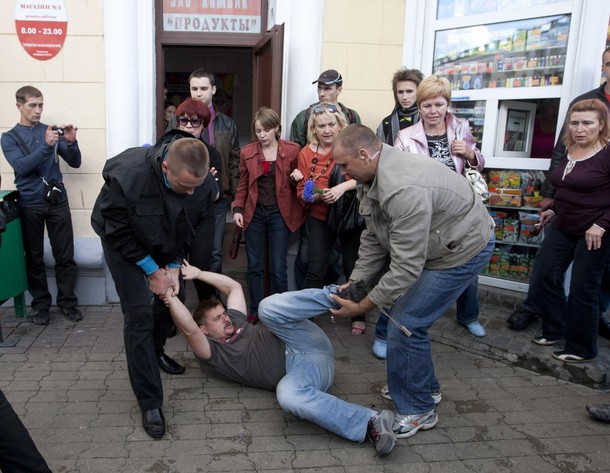
From Yuras Karmanau, the AP: Belarus’ authoritarian president is trying to tighten his grip on the ex-Soviet nation with new legislation that boosts the already sweeping powers of the secret police, still known as the KGB.
As well as lifting restrictions on the KGB’s use of weapons, the legislation gives KGB officers the authority to break into residences and offices and makes it even easier for President Alexander Lukashenko to put his political opponents behind bars.
A new ban on receiving foreign funds carries a two-year prison sentence, while simply calling for an anti-government protest can send someone to prison for three years. The government is also expanding the definition of treason in such a way as to cast possible suspicion on anyone working for a foreign organization. . . .
The past summer saw a wave of demonstrations against Lukashenko’s regime by people who clapped their hands, stomped their feet or simply smiled. Initially caught by surprise, police quickly started rounding up demonstrators even though their actions did not violate any law because they chanted no anti-government slogans and carried no signs.
The set of legal amendments, passed at a closed session of parliament earlier this month and posted on a government website Thursday, now give police formal justification for clamping down on those taking part in the protests despite the absence of any political demands. Gatherings for "active inaction" will now be banned.
The presidential administration said it would not comment on the new measures, which were submitted by Lukashenko. He still needs to sign them into law.
A separate legal amendment expands the definition of treason to include "assisting a foreign state, a foreign organization or its representative to the detriment of Belarus’ national security," which is punishable by a prison sentence from seven to 15 years.
"They want to scare society, to demonstrate that this KGB monster can do whatever it wants," said Anatoly Lebedko, the leader of the opposition United Civil Party. "Involvement in political activities is now effectively equal to a crime in Belarus." (photo: Reuters)
Image: reuters%2010%2016%2011%20Belarus%20KGB.jpg
